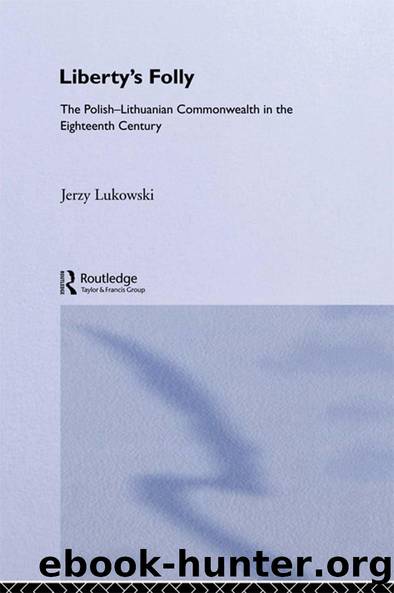Libertys Folly:Polish Lithuan by Jerzy Tadeusz Lukavski

Author:Jerzy Tadeusz Lukavski [Lukavski, Jerzy Tadeusz]
Language: eng
Format: epub
Tags: History, General
ISBN: 9781136103728
Google: OI-3f0olkGAC
Publisher: Routledge
Published: 2013-06-17T15:56:11+00:00
AUGUSTUS III, POLAND AND EUROPE
Polish historians have traditionally portrayed Augustus III as a cipher for the greater part of his reign in the hands of his favourite and chief minister, Heinrich Brühl, a man whose reputation for financial corruption in Poland was exceeded only by his reputation for the same in Saxony. Augustus II had given his son the best education that money could buy. Yet when Charles VIâs ministers had decided to support the new electorâs candidacy in March 1733, one of the factors in his favour was his apparent stupidity. Augustus III had been taught Polish, but was reluctant to use it. His poor grasp of Latin did not facilitate communication with his new subjects. His conversion to Catholicism in 1717 was less cynical than his fatherâs. The energy which Augustus II had put into sex and drink his son put into piety and gluttony. His consort, Maria Josepha, was supposedly the more actively interested in politics, at least in relations with her native Austria. Heinrich Bruhlâs extraordinary predominance was at least partly attributable to her unfailing support. By the end of the reign the initial bitter hostility which Augustus III had met had given way to a widespread affection. Clad in his ceremonial robes his corpulent body exuded a kind of majesty. He had long abandoned any effort to tamper with Golden Liberty. He had become what the szlachta wanted in a king.
It is not yet possible to say whether a more complex reality underlay this obvious stereotype.2 At the very least, the patron of Johann Sebastian Bach must have had some positive qualities. On the face of it, Augustus III achieved nothing in Poland. The constitution remained unaltered, just as the kingâs agreements of 1733 with Austria and Russia had laid down. Factional strife checked all attempts at reform. Foreign, especially Russian and Prussian, political intervention and military violation reached new heights. Augustusâ first attentions were directed to higher things than his Polish acquisition. He had no intention of giving up his wifeâs claims to the Habsburg patrimony. On the death of Charles VI, he might even count on acquiring the title of Holy Roman Emperor. Like his father, however, Augustus III was dangerously dependent on the support of others for the fulfilment of such schemes. After his disastrous flirtation with that thinking manâs thug, Frederick the Great of Prussia, in the early phases of the War of the Austrian Succession, he found he had no choice but to revert to the Austro-Russian protectorate which had put him on the Polish throne.
It was Russia which was the dominant external force in Polish politics, a role confirmed by the events of 1733â6. Peter the Greatâs conquests had made a powerless Poland more important than ever. Polish irridentist feelings for the lost avulsa, far from dead, were matched by Swedish irridentism. To regain the lost Baltic provinces, Sweden went to war with Russia in 1741 and again in 1788. During Russiaâs war with Turkey of 1736â9, the Potockis
Download
This site does not store any files on its server. We only index and link to content provided by other sites. Please contact the content providers to delete copyright contents if any and email us, we'll remove relevant links or contents immediately.
Room 212 by Kate Stewart(4122)
The Crown by Robert Lacey(4121)
Endurance: Shackleton's Incredible Voyage by Alfred Lansing(3859)
The Iron Duke by The Iron Duke(3657)
The Rape of Nanking by Iris Chang(3531)
Killing England by Bill O'Reilly(3467)
Joan of Arc by Mary Gordon(3272)
Say Nothing by Patrick Radden Keefe(3077)
I'll Give You the Sun by Jandy Nelson(2849)
Shadow of Night by Deborah Harkness(2748)
Hitler's Monsters by Eric Kurlander(2741)
Margaret Thatcher: The Autobiography by Thatcher Margaret(2691)
Mary, Queen of Scots, and the Murder of Lord Darnley by Alison Weir(2683)
Darkest Hour by Anthony McCarten(2655)
Blood and Sand by Alex Von Tunzelmann(2615)
Red Famine: Stalin's War on Ukraine by Anne Applebaum(2472)
Eleanor & Park by Rainbow Rowell(2402)
The One Memory of Flora Banks by Emily Barr(2357)
Book of Life by Deborah Harkness(2286)
